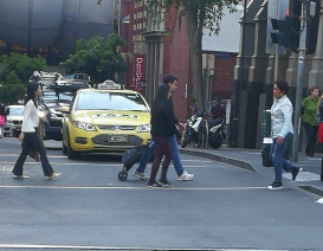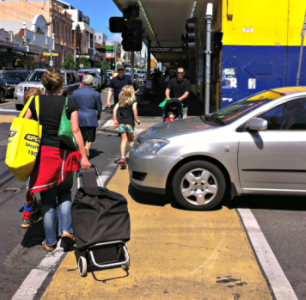What to do if you’re hit by a car while walking
The Roaming Lawyer - Megan Caines from Polaris Lawyers
Most of us never expect to be involved in an accident. It is common to freeze or go into shock, but the decisions you make at the time of the crash as well as in the subsequent days and months can make a big difference to your health, ability to access treatment, peace of mind and potential compensation.
Here are some important things to keep in mind if you are struck by a car while walking, or if you witness a crash.
At the scene

Safety First - Ensure you and others are safe from further harm & notify emergency services
Get off or away from the road as soon as it is safe to do so. In situations where you or another person is unable to move off the road immediately, traffic should be directed away from those at risk and the emergency services should be called without delay.
If you or others have been injured and require an ambulance you should call 000 and inform the emergency services that an ambulance is needed. The emergency services will then co-ordinate other services and dispatch Police. You will be required to calmly tell the service:
- Where the emergency is
- What has happened
- When the crash took place
Try to remain calm during this time. Not only will it reduce the stress you are experiencing, but you are also more likely to remember what else you need to do.
Ensure the driver does not leave, and obtain their details
Clients have reported feeling shock, anger, frustration and embarrassment after a crash. It is also natural to want to down play what has happened and the impact it is having on you. You may want the whole thing to be over… but it is important not to rush out of there or allow others to rush off.
Take down details of the people involved in the accident, as well as those of any witnesses to the crash, even if you think you are 100% fine. People often do not realise the extent of their injuries until several hours, if not days after the crash, and the aftermath of the accident may be your only opportunity to obtain all the information you might need in the future.
Make sure you get:
- The name of the driver;
- The address of the driver;
- The license number of the driver (the beauty of a smart phone means it is a five second job to take a picture of their licence, but ensure you take a snap of both sides)
- Registration of the car that hit you (this is particularly important for the purpose of determining who the insurer is);
- The name of the car owner (if it is not the driver);
- The other party’s insurance details.
Obtain other evidence
Taking down the details of any witnesses is always a good idea, and it is also worth asking if anyone has any dash cam footage of the crash. Utilise your camera phone and take photos of the vehicles involved, the street signs, the footpath, the pedestrian crossing; whatever is in close proximity to the crash site. You may never need them… or they might be important evidence down the track. Taking a few pictures of any bruising or injuries you have sustained may also provide context for any injuries that you become aware of at some later date (and give you a good war story at family dinner).
Later on...

Notify the Police
If the Police do not attend the scene of the crash you should go to a Police Station as soon as practical after the accident and ensure a collision report is made. In order for a Transport Accident Commission (TAC) claim to be accepted the crash needs to be reported to the Police.
Seek medical attention
Paying a visit to your GP and outlining any injuries you have ensures that you are properly examined following the crash. Even if you have had a quick once over at the hospital, a trip to your local GP cannot do any harm. Seeking medical attention sooner rather than later can also help to avoid any pesky “how do we know this injury was caused by the crash?” arguments from the TAC when you are seeking payment of your treatment expenses.
Don’t ignore your mental health. The stress and trauma the flows from road accidents should not be brushed aside. If you are experiencing increased anxiety, flashbacks or intrusive thoughts about the crash, you should discuss treatment options with your GP. There is also support available through the Road Trauma Support Services https://www.rtssv.org.au/
Lodge a TAC claim
The TAC is the insurer in Victoria for personal injuries sustained in road accidents. As a walker hit by a car, you have entitlements under the TAC scheme. The entitlements can include medical treatment, wage replacement and lump sum compensation. There are time limits to lodge a TAC claim and the sooner you lodge the claim after the crash the easier the process will be. You can contact the TAC on 1300 654 329.
Get Legal Advice
It is never too early to know your rights. Personal injury lawyers will usually provide free initial advice, and it is important you understand how to access compensation for your out-of-pocket medical expenses and your time off work. Furthermore, engaging a lawyer at an early stage may allow them to investigate the crash circumstances before memories fade or other information disappears.
If the lawyer thinks you have a viable claim for compensation they will usually offer to act for you, it is important to remember that while it is a good idea to have a lawyer in your corner, you are under no obligation to engage the first one you discuss your claim with. In some cases, a claim for compensation may be crucial to your financial future, and you should always be comfortable and confident in the individual lawyer and the values of their firm before you retain them.

Megan Caines is a Senior Associate at Polaris Lawyers, who has acted for hundreds of pedestrians injured on Victorian roads. She is passionate about the rights of people injured on the road and in the work place.
Do you have a legal question about walking (a general issue, not specific to your personal circumstances)? Contact us at Victoria Walks and we'll see if we can answer it in a future column.